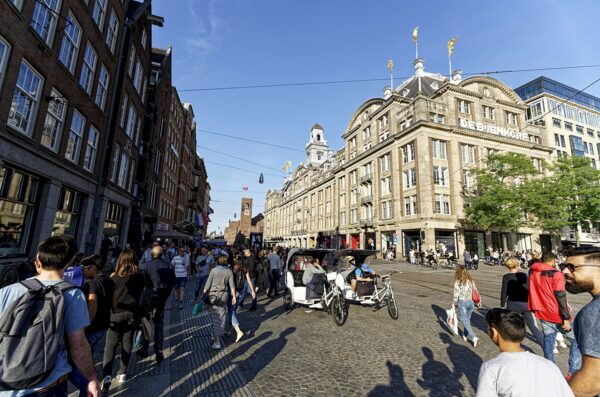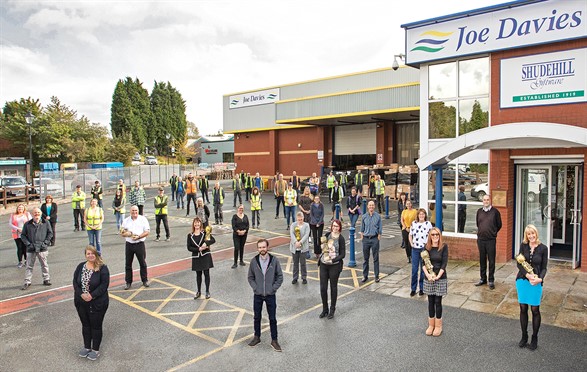 Alan Monahan writes: These days we hear so much about campaigns to ‘Save the High Street’ that I suspect there are people – some in our own industry – who have almost taken it for granted that there is little future for shops in Britain’s towns and villages.
Alan Monahan writes: These days we hear so much about campaigns to ‘Save the High Street’ that I suspect there are people – some in our own industry – who have almost taken it for granted that there is little future for shops in Britain’s towns and villages.
But hang on a moment. Are we perhaps too close to the problem? Indeed, is it as big as we imagine? I ask because a self-confessed newbie at the Local Data Company (LDC) has brought what he describes as a ‘fresh, and perhaps optimistic viewpoint’ to the debate.
Step forward Louis Farquharson who, after pondering high profile store closures over the past eight months, points out that despite the struggles of House of Fraser and a string of other famous retail names, GB retail vacancy rates haven’t been shooting up as you might have expected. In fact, LDC data shows that they rose for the first time since 2012 at the end of 2017 by just 0.2%., while the first half of this year saw an increase of 0.1%.
It will come as no surprise that pubs on the high street have seen the most dramatic reduction in net numbers, but these retail spaces are mostly being reoccupied. As Farquharson says, while it may sound alarming that 22.7% of pubs have been closed since 2012, figures show only 3% have remained vacant and many others are being converted into units for other uses.
What took me aback wasn’t the fact that women’s clothing saw the largest percentage churn in occupier – with just under half seeing a change – but that gift shops were the highest non-fashion category replacing some 65 stores! If you believed that the days of the gift retailer were numbered, think again.
Questioning whether ‘the death of the high street’ is a myth, Farquharson says that with many well-known brands falling into administration and undergoing CVAs it is understandable that people are starting to feel a sense of doom.
But he cautions that it is important to look at the whole picture, using data to understand and evidence the trends under the headlines. Despite the raft of political, social and economic challenges retailers face today, new occupiers are often providing the green shoots of growth.
Farquharson says that our high streets aren’t dying, but just evolving – and in the future they will look very different as the expectations of ‘experiential retail’ continue to develop in consumers’ minds.
I’m not sure how all this squares with Office for National Statistics’ figures which show that 3,200 stores have disappeared from our high streets in four years, but I do know that I’d rather go with the optimistic view!
As this column is read not only by retailers but also people across our industry, I want to draw attention to a new initiative from Enterprise Nation which is aimed at helping the UK’s small firms plan for Brexit.
I’ve checked with Sophie at the business support group and you don’t have to be a member to use the service, which will deliver free Brexit impact assessments and advice to help even the smallest British companies identify the key challenges they may face and get ready for potential regulatory and financial change.
It also brings in the expertise of O2 Business and other organisations including the Institute of Chartered Accountants in England and Wales, the Intellectual Property Office, the Institute of Export, currency expert OFX and international distribution firm UPS.
Enterprise Nation founder Emma Jones says: ‘As we inch ever closer to a no deal Brexit, it feels like time is rapidly running out for small firms to work out how leaving the EU might affect their business, any actions they need to be ready to take and costs they may have to bear as a consequence. While larger firms have already spent millions on preparation, smaller companies just haven’t the time or resources.’
She believes that the Brexit Advice Service will go a long way to help them be prepared for all eventualities, and adds: ‘The fact that we don’t know the political detail can no longer be used as an excuse for not helping firms prepare. We need to roll up our sleeves and get on with it.’
So, a bouquet for her and all those who are stepping up to the plate with the offer of diagnostic tools to help firms identify what areas of regulation they need to be prepared for, such as finance and funding, IT and web, HR, logistics, IP and legal and strategy, then linking them with advisers, articles and products that can assist and prepare them for the post-Brexit period when more clarity emerges.
For example, O2 will be promoting its latest Business Essentials and Small Business Tariffs, offering calls and texts from the UK to EU countries at no extra cost.
Find out more at http:/www.enterprisenation.com/brexit-advice-service/
I’m climbing back on an old hobby horse amid growing concern that consumers’ access to cash is under threat, due to a severe reduction in bank branches on our high streets and changes to the funding model of ATMs that is seeing 250 disappear every month.
Some retailers are travelling miles to pay in cash takings because their local bank branches have disappeared, and this has also resulted in fewer town visits by consumers, which has inevitably hit shop sales.
Now, an online survey by Which? of more than 2,000 adults has found that lower income households and older generations are hardest hit by these closures.
More than three-quarters of consumers in the two lowest income household groups rely on cash, using it at least two or three times a week. They are less likely than average to use a credit card or debit card – in fact, just over a quarter never make card payments.
Cash usage is also high among over-65s – the group perhaps most at risk of social exclusion when bank branches and ATMs disappear – with four in five reliant on cash, using it at least two to three times a week.
The research also reveals that almost everyone (98%) uses cash and 41% were worried about moving towards a cashless society, citing the increased scope for scams with credit and debit cards and, following a series of IT collapses at the major banks, the reliability of electronic payment systems.
The survey also found six in 10 consumers had experienced a time in the last three months when they could only pay by cash.
But none of the above will matter a jot to the profit-driven banks who are forcing us to conduct our financial business on the internet.
Last week I bumped into a neighbour. He was taking pound and two-pound coins collected at a Macmillan Cancer Support Coffee Morning to the local shop to change into notes. ‘Then I’ll take all the money to the bank,’ he said. ‘If I can find one!’
















